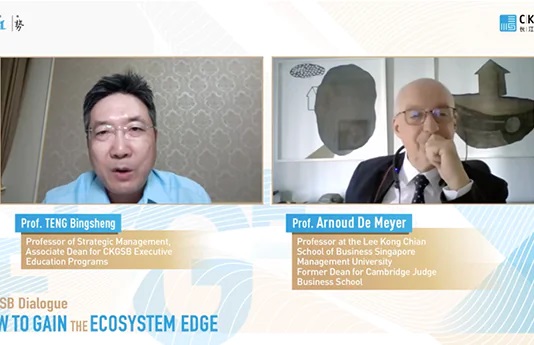Cheetah Mobile CEO Sheng Fu on how the company became a big mobile app developer with global reach in just a few years and is thriving despite its free-to-use model.
Chances are that unless you are in the mobile internet business, you may not have heard of Cheetah Mobile. The reason is simple: Cheetah Mobile, which was spun off from software company Kingsoft, is mostly in the business of creating utility and security apps, apps that sit on your smartphone and boost its performance. Its apps include Clean Master, CM Security, Battery Doctor and Duba Anti-virus. But on the back of what may appear to be boring apps (we aren’t talking of games or social media after all), Cheetah Mobile has built a massive user base: at last count they had 500 million users across the globe. Cheetah’s apps consistently rank high on “Google Play’s global non-game Apps developers’ ranking” and earlier this year, it got the “No. 3 Top Publisher spot (after only Facebook and Google) for Worldwide iOS and Google Play downloads outside of games” according to App Annie.
In 2014 Cheetah Mobile joined a growing list of Chinese companies to launch an IPO on the New York Stock Exchange raising $168 million in the process. The company, launched only in 2010, took a decision very early on to go global, and now it has R&D centers in several Chinese cities, an office in San Francisco, and counts China, the US, Europe and India among its major markets. According to Cheetah’s young CEO Sheng Fu, China’s brutally competitive market for mobile apps forced the company to think out of the box and develop capabilities that, he believed, would hold it in good stead in global markets.
In this interview Sheng Fu talks about the importance of global markets vis-à-vis China, making money with their free-to-use model, and the future of the company as it branches out into the mobile advertising space post the acquisition of French mobile advertising firm MobPartner.
Q. It’s taken you four to five years to grow from virtually zero to an IPO in the US and also go global. What do you attribute this success to?
A. Last year, among Chinese company IPOs in the US market, our stock price growth rate was the highest one. Now it’s around $27-28 but when we went public, our price was $14, so we have almost doubled it (NOTE: The share price is from end of July 2015 when this interview was conducted). That’s within one year. Maybe it’s the highest growth rate in Chinese companies. It’s a [virtual] tsunami of mobile internet and globalization.
Cheetah Mobile grew very fast and changed hugely because of our globalization strategy. About three years ago, I realized that [there was] a huge opportunity for Chinese companies to go global. At that time, almost no Chinese company focused on the market outside of China because the Chinese market [itself] is so huge and you can get a huge user base and huge revenue [here]. But at that time, competition in China was fierce. So start-ups and small companies could not compete with BAT (Baidu, Alibaba and Tencent), Qihoo and Xiaomi. But I found the opportunity outside of China because I realized that innovation from China is ahead of other country’s companies.
In the PC age, the Chinese companies just followed the US companies in strategy. In the mobile age, some different, some unique innovations from Chinese companies [arose]. Chinese companies lead the mobile age just like the US companies: for example, [in] the free-to-use model. Because Chinese people don’t pay for software, Chinese internet companies developed the free-to-use model. This model worked very well. All the apps and software in China [were] totally free. But at that time, all the software and apps in the global market and US market [worked on the] paid model, so this is a huge opportunity for us. We can use a free-to-use model to expand our user base all over the world.
The second is the user experience. China has a huge population and many users [will] never use the PC. So when we developed the software and app, we paid deep attention to the user experience. We designed every button, every interface, and every style to test our users. So we know what kind of user experience is good for [inexperienced] users.
So these two innovations on the model can help our software lead all over the world. But at that time, no Chinese company knew that. We went first. Although we are in China, we put all our resources outside China to compete with the US and other country’s companies. We had the confidence to win. That is a key point.
About three years ago, we focused on the overseas market. We focused on one very small thing: just Clean Master. It’s a very small app, but the Chinese market already proved that the security and utility apps [space] is a huge opportunity. But other companies didn’t know that. We bet, and then we won.
Three years ago, our monthly active user [number] was about 40 million only in China. But now we have 500 million, and 70% from outside China. Thirty per cent of our users come from China, 20% from the US and Europe, India maybe 10%, and others…
Q. You talked about how China is ahead in the mobile age in terms of innovation and to an extent, that’s also a function of the amount of competition in the Chinese market. How do you rate the amount of competition in China versus the amount of competition you face abroad?
A. Actually the competition in China is fiercer than before. It’s not only the free [model]. It’s [also where companies] subsidize and burn cash. Uber just raised $1 billion for the Chinese market. First, [the competition is] fiercer. Second, three years ago, you could just focus on the internet industry. But now the competition is ‘outside’ the internet: it’s the combination of the internet and traditional industry or O2O (online to offline). O2O in the US is on-demand market. It’s online to office. So I think now the competition is on the ‘edge’ of the two industries.
Q. If Cheetah hadn’t gone to the US, would it have survived in China?
A. I think [we could have] survived in China but [we wouldn’t] be No.1. Maybe we would have been a good company, but not an excellent company.
Q. How does your free-to-use business model work? How do you make money?
A. Globalization gives us a huge user base. But it’s not just the user base: it’s also a global view of the mobile internet. Before we made money from the overseas market, all the investors asked us: “How can you make money from outside China? No Chinese company has ever done this.”
Frankly, at that time I didn’t know. But if Google, Facebook, if all US companies can make money from outside China,… you know Google and Facebook have no business in China, but they are the most profitable companies in the world, so I think it’s not a big question. Last quarter, half of our mobile revenue came from overseas market, and this quarter, mobile revenue grew faster than other revenue. That’s the only prediction I can make about our financial report.
Now how to make money… [As we] expand our business across the globe, we cooperate with global companies such as Google and Facebook. Maybe you don’t know, Cheetah is now Facebook’s biggest partner. Facebook mentioned Cheetah Mobile in its Q1 financial report: we are the only partner that Facebook mentioned in their Q1 report. We cooperate with Facebook and Google [to] help them distribute their advertisements. So we can make money. This is a very [early] stage [from the] revenue [perspective].
We learn from Facebook and Google. Facebook [has] a huge user base [that helps] build big data [which is used] to build this advertisement platform. Cheetah also has a huge user base. Every company with a big user base should build their own advertisement platform, but through a huge big data center. Cheetah Mobile now has a user base of 500 million, so we can build our big data center then use big data to analyze [and] target our users to promote and distribute mobile advertisements.
Q. Are there any limits to the free-to-use model?
A. Every model has its limitation, but the free-to-use model’s scale is much larger than paid model because ‘free’ can expand your user base very quickly and you can reach million users [faster]. I think the only [challenge] in the free-to-use model is if you can build your big data center successfully. If you can build your big data center successfully, it’s like building an oil platform, so you can get more and more useful information from the big data center.
Q. How advanced are Cheetah Mobile’s big data capabilities and what’s the final goal?
A. We have just started [in big data]. Yahoo just closed its Beijing research center but the engineers in that center were very good. We hired more than 40 people from Yahoo and the whole big data team came to Cheetah Mobile. But we have been building our big data team for six months only. So we are at the very beginning, very [early] stage. The target is to give users the most useful information. You can picture it: we now have 500 million users and every user has unique information and behavior at different times. [Understanding that] is [our goal in] big data.
Q. Do you see yourself moving away from utility apps in the future, more towards the advertising space? What is the future of the company?
A. First, we need to change our view of advertisement. In the past, advertisement just meant pop-ups and banners. But in the mobile age, advertisement is information, just like your research result, your subscription list. If the advertisement matches your [needs] very precisely, users won’t hate it. So I think there is a long way for Cheetah Mobile to go, to further build our big data platform. This is a long-term strategic investment. But on our user’s side, the utility and security is just the foundation. We present more apps for users, such as Launch, a desktop for your phone, some news, some lifestyle, some social,… more engaging apps.
Q. So your portfolio will look very different from what it looks like today?
A. Maybe. You never know. Two years ago, we were PC-based and only in China, and [a] very small company. Now we are global and [have a] huge user base. We are at the very [early] stage in advertisement, but maybe three or five years later, we can be among the top three advertisement platforms all over the world. [Maybe we] can really be an innovative company. Maybe we can have our own X lab just like Google X. We can invent some new technologies, not just utility or cleaning apps. Maybe we can have some really amazing, avant-garde techniques, the best talent not only from China, but from all over the world.
Q. Some months ago you launched an air purifier. How does it fit into your portfolio?
A. Smart hardware is very hot in China and Xiaomi’s Chairman Lei Jun is also our Chairman. Smart device is a [big] opportunity for companies. We need to try it. We actually invested in a small start-up to produce air purifiers. It doesn’t consume too much of our resources, but we already some experience. So we will [allocate more] resources to smart devices, but maybe not to launch more hardware, but [help a] device company to make their device smart. Maybe we can build big data for them.
Q. Who do you view as competition both within China and outside China?
A. Going global means to learn some different ideas compared to the past. Before we went global, we thought that competition was the most important, so we must focus on competitors. Three years ago I realized, [we shouldn’t] compete with competitors but look for a new path with them.
I don’t think we have real competitors in China because our strategies are totally different. Although some companies also want to go outside of China, it’s not their [key] strategy. [They] just test [the waters]. But our key strategy is ‘go global’. Now, no Chinese company can compete with us in the global arena. But in the future, maybe some companies will want to compete with us. Now we have huge advantage over them. In utility and security, I don’t think there are real competitors. But when we enter the advertisement platform, I think our advertiser platform is different from the [industry] leaders. We will cooperate with the [industry] leaders in areas they are strong in. But in a new area, we can develop our [own] platform such as video advertisement and so on. So in the future, I will spend more time to search [for] a different path. I will avoid strong competition.
Q. So you will go to areas that are less contested.
A. There’s a famous book in the Bay Area, From Zero to One (by Peter Thiel and Blake Masters). To find a new growing market is better than to find a developed market. Our strategy is to look for a growing market, but [in] any current market, we can cooperate with our competitors. From the global view, the internet is [at a] very [early] stage. In China, the internet is expanding to traditional [industries] such as taxi, laundry, finance,… We have a huge opportunity to expand this all over the world. We don’t need to fight with our competitors. If they are strong in this area, we can cooperate with them, such as our strategy with Facebook.
Q. If you rank your global markets in terms of importance, what are the top two or three markets and what are your plans for them?
A. The top three important markets for us are the US, China and India. The US market is an important revenue[-generating] market. The Chinese market, we know [it] very well. We have good relationships with all the leaders, except Qihoo. All the leaders in Chinese markets want to help us. But two years ago we were a small company so we didn’t have too many resources either in China or globally. But now we have the ability to return to China. I think in the Chinese market, we can get more users.
India is the future. This year, our users from India grew very fast, faster than any other country. Although the revenue from India is very small, I think if we focus on India, we can grasp the next big opportunity in the next five years.




















